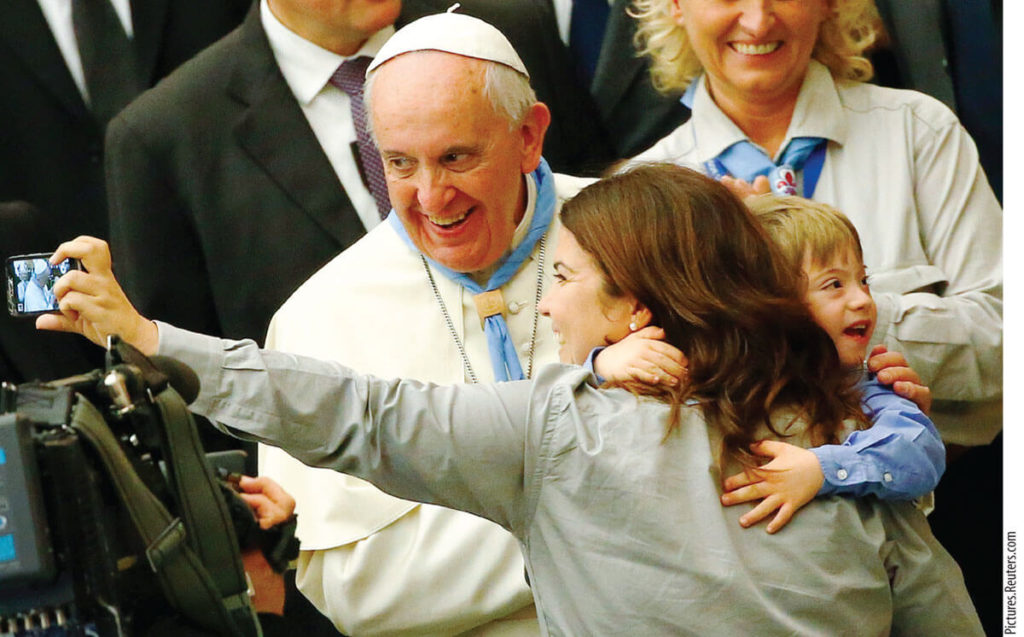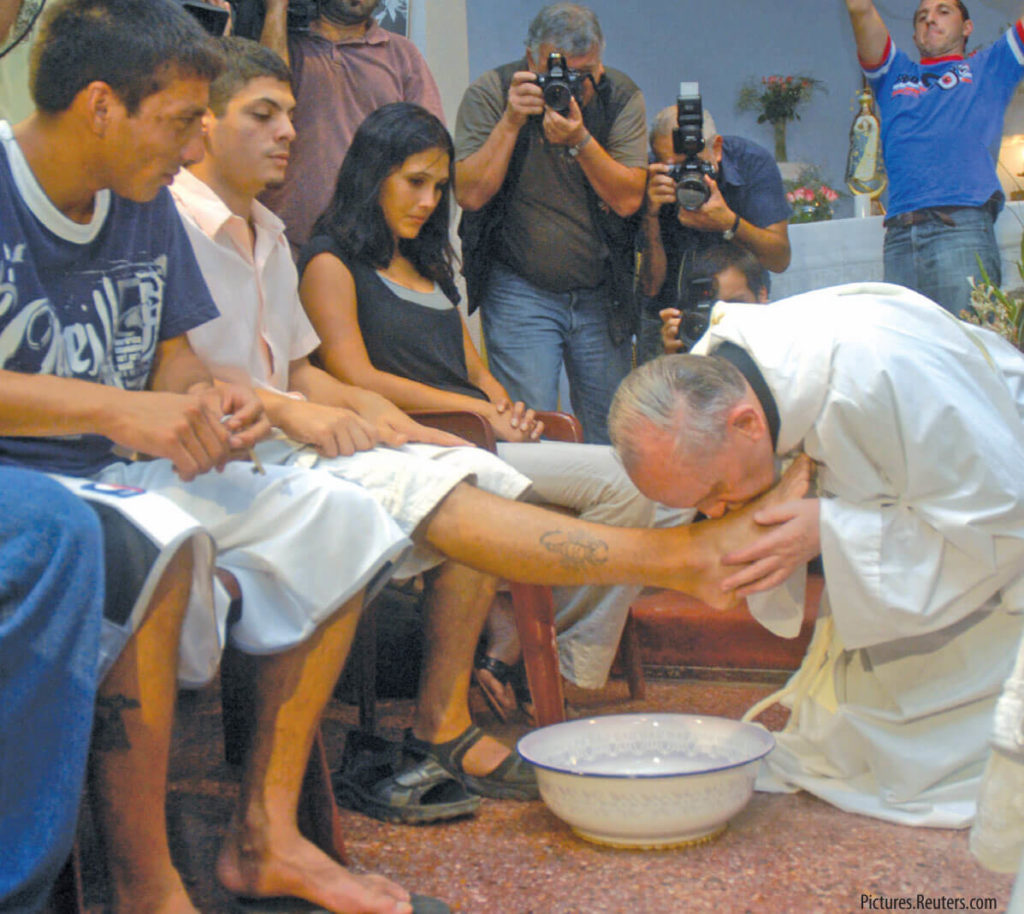
People like to take selfies with the pope. Not only is Pope Francis thriving in the contemporary digital world but he is a man of the new world of the Americas, who likes soccer, maté, and tango. Francis’s parents immigrated to Argentina in 1929, when they saw the forces rising in Italy that led to World War II. He views the Church and world with the eyes of an Argentinian, with special concern for the people of the barrios.
Jorge Bergoglio was born and grew up in Buenos Aires, Argentina, with two brothers and two sisters. He studied chemistry in college. As a young man, he worked as a janitor, a bouncer at a bar, and chemistry technician.
Then in 1958, he joined the Society of Jesus, the Jesuits, a religious order of priests who have schools and universities all over the world. That same year John XXIII became pope. Pope John soon called for the Second Vatican Council, a meeting of the bishops of the whole world. The new pope wanted to open the window and let in the winds of the Holy Spirit to renew the Church.
When the bishops of Latin America came home from Vatican II, they embraced its emphasis on solidarity with the poor and afflicted. They gathered in Medellín, Colombia, in 1968. Together they committed to serve the multitudes of people who are poor in their countries as their number one priority. They called the commitment “the option for the poor.”
Jorge studied and learned to be a Jesuit in the midst of all this change. He was ordained a Jesuit priest in 1969. Just four years later the Jesuits put him in charge of their priests. Then military dictators rose to power.
The dictators disappeared thousands of those who worked with people in the barrios. The word disappeared refers to people tortured and killed, never found or accounted for. This era in Argentina’s history is called the Dirty War. It is the era when the Mothers and Grandmothers of the Disappeared begin standing in the Plaza de Mayo in Buenos Aires to protest the loss of their children, an action they have done for decades.
Two Jesuits worked in the barrios in Buenos Aires. The Dirty War endangered their lives. Father Bergoglio urged the two to leave their work with the poor and get out of danger. The priests wanted to stay with the people. Both were kidnapped and tortured but not killed. Many with land and wealth feared that the Church’s emphasis on the poor could lead to revolution and put their land and wealth at risk.

When he became Archbishop of Buenos Aires in 1998, Archbishop Bergoglio himself often spent time in the barrios where people who are poor put up ramshackle houses out of any building material they could find. He set up food and education centers in the barrios. He celebrated Mass with the people there and honored their feasts and devotions.
In his exhortations, Pope Francis always talks about the impact of world problems on people who are poor and cannot protect themselves from the effects of climate change. For example, in parts of Africa the land farmers depend on has become desert. Rising sea levels flood island peoples in the Pacific off their islands. Warmer sea waters change fishing grounds and leave people without a livelihood.
Francis wants the people of God, the Catholic Church, to stand with those who suffer, to be a Church of the poor and for the poor. He writes, “I prefer a Church which is bruised, hurting, and dirty because it has been out on the streets, rather than a Church which is unhealthy from being confined and from clinging to its own security” (Joy of the Gospel, #49).
Pope Francis made news when he was elected pope by staying a man of the people. He wore his old black shoes with his new white pope cassock. He took the bus and paid his own hotel bill. On Holy Thursday he washed and kissed the feet of young prisoners, two of them young women. He chose the name Francis as pope because St. Francis renounced his father’s wealth and identified with people who are poor.

Francis is a joyful pope.
In his first exhortation, Evangelii Gaudium, he calls us, the people of the Church, to open our hearts to encounter with Jesus and then to share the Joy of the Gospel, the English title of the exhortation. He reminds us that life grows by being given away. It is joy that attracts others to Jesus’ good news.
“The gospel tells us constantly to run the risk of a face-to-face encounter with others, with their physical presence which challenges us, with their pain and their pleas, with their joy which infests us in our close and continuous interaction. True faith in the incarnate Son of God is inseparable from self-giving, from membership in the community, from service, from reconciliation with others. The Son of God, by becoming flesh, summoned us to a revolution of tenderness” (Joy of the Gospel, #88).
Francis is a green pope.
He timed his second exhortation Laudato Si’ to coincide with the Paris 2015 U.N. Conference on climate change. In Laudato Si’ Frances urges support for international agreements to reduce climate change and protect Earth’s poorest people. He calls us to repair our common home.
Pope Francis never forgets the people of the barrios of Argentina who live on $2 to $10 per day. Like most people in the world, they live below the official U.S. poverty line — $25,100 for a family of four in 2018. He speaks against an economy that excludes people and creates inequality. He asks, “How can it be that it is not a news item when an elderly person dies of exposure, but it is news when the stock market loses two points?” (Laudato Si’ #53)
Francis is a pope for families.
For Francis life is a process that requires time and God’s grace. In family life relationships take time to build and time to heal when people hurt each other. He called the Church together for a Synod on the Family. In Amoris Laetitia, On Love in the Family, Francis summarizes the synod and explains “there is a need to accompany with mercy and patience the eventual stages of personal growth…, making room for the Lord’s mercy which spurs us to do our best” (295).
Francis is a pope for young people.
This October Pope Francis called together another synod, this time the subject: Young People, the Faith, and Vocational Discernment. The synod explored recognizing, interpreting, and choosing a life.
Reality is greater than ideas, the pope insists. He wants to know what life is like for young people ages 16-29 — hopes and fears, attitudes toward the Church, the problems where they live, such as crime, trafficking, corrupt politics. Many have answered his questions in their dioceses and through the online questionnaire. The pope suggests the world for young people is a polyhedron, reflecting many facets — globalization, families, relationships with adults, music, sports, work, life choices, education, inequality for girls, jobs, professions. How does one form a life in a digital world?
The pope fears that “many young people declare that they are looking for the meaning of life, pursuing ideals, searching for their own personal spirituality and faith, but they rarely turn to the Church” (63). He also notes “the call to holiness plays out in the practice of our everyday life. Jesus’ words are few and straightforward, yet practical and valid for everyone, for Christianity is meant above all to be put into practice” (109).
